|
|
|
Sort Order |
|
|
|
Items / Page
|
|
|
|
|
|
|
| Srl | Item |
| 1 |
ID:
111237


|
|
|
| 2 |
ID:
131567
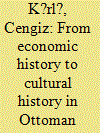

|
|
|
|
|
| Publication |
2014.
|
| Summary/Abstract |
Reflecting on the state of Ottoman social history poses a paradox. On the one hand, it is impossible not to appreciate the great strides accomplished over the past three decades. Earlier approaches have been challenged, topics that were previously untouched or unimagined have been studied, and the foundations of a meaningful dialogue with historiographies of other parts of the world have been established. On the other hand, the theoretical sophistication and methodological debates of Ottoman social history still look pale compared to European and other non-Western historiographies in the same period.
|
|
|
|
|
|
|
|
|
|
|
|
|
|
|
|
| 3 |
ID:
131574
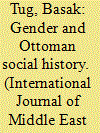

|
|
|
|
|
| Publication |
2014.
|
| Summary/Abstract |
Starting with Said's critique of Orientalism but going well beyond it, poststructuralist and postcolonial critiques of modernity have challenged not only one-dimensional visions of Western modernity-by "multiplying" or "alternating" it with different modernities-but also the binaries between the modern and the traditional/premodern/early modern, thus resulting in novel, more inclusive ways of thinking about past experiences. Yet, while scholars working on the Middle East have successfully struggled against the Orientalist perception of the Middle East as the tradition constructed in opposition to the Western modern, they often have difficulties in deconstructing the tradition within, that is, the premodern past. They have traced the alternative and multiple forms of modernities in Middle Eastern geography within the temporal borders of "modernity." However, going beyond this temporality and constructing new concepts-beyond the notion of tradition-to understand the specificities of past experiences (which are still in relationship with the present) remains underdeveloped in the social history of the Middle East.
|
|
|
|
|
|
|
|
|
|
|
|
|
|
|
|
| 4 |
ID:
184156


|
|
|
|
|
| Summary/Abstract |
This article presents a new interpretation of the reign of the Ottoman sultan Mehmed the Conqueror (r. 1444–46, 1451–81) as refracted through the twin historical lenses of Mughal South Asia and the Renaissance Mediterranean. On the one hand, it argues that Mehmed, despite his current reputation as a conquering hero of Islam, in fact aspired to a model of sovereignty analogous to Akbar's Sulh-i Kull, and with a common point of origin in the conceptual worlds of post-Mongol Iran and Timurid central Asia. On the other hand, it also draws from the historiography of the Italian Renaissance to interpret Mehmed's cultural politics as being simultaneously inspired by a particular thread of Renaissance philosophy, the Prisca Theologia, which in many ways served as the Ottoman equivalent of Akbar's Sulh-i Kull.
|
|
|
|
|
|
|
|
|
|
|
|
|
|
|
|
| 5 |
ID:
131463
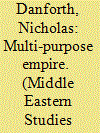

|
|
|
|
|
| Publication |
2014.
|
| Summary/Abstract |
This article examines popular, academic and political perceptions of the Ottoman Empire in Republican Turkey, challenging the widespread assumption that there has been a continuous clash between pro-Ottoman Islamists and secular, anti-Ottoman, Kemalists. It argues that in the Republican period Kemalists effectively appropriated the Ottoman past for use in their nationalist narrative, not only through using a 'theory of fatal decline' but also by simply defining positive cultural or political symbols from the years 1299 to 1923 as 'Turkish' rather than 'Ottoman'. This serves as a backdrop for the article's main argument, that the 1940s and 1950s saw a thorough Kemalist appropriation of the Ottoman past, celebrating the empire's golden age as secular, pro-western and Turkish. The 500th anniversary of the conquest of Istanbul in 1953 gave the Turkish government an opportunity to showcase this new interpretation of Ottoman history as well as to use the relatively new rhetoric of 'Ottoman tolerance' to claim for Turkey a place among its new allies in the democratic, anti-communist West. At the level of domestic politics, the Democratic Party sought to wrap its modernization policies in the mantle of a progressive, democratic Fatih Sultan Mehmet II, while the Republican People's Party condemned the Democrats for betraying Fatih's memory and the nation's honour by downplaying the Ottoman past in order to placate potential anti-communist allies in Greece and the Arab world. Ultimately, the article argues that it is impossible to understand contemporary Islamist and liberal uses of the Ottoman past without understanding the way the empire was incorporated into the dominant Turkish nationalist narrative between 1923 and 1953
|
|
|
|
|
|
|
|
|
|
|
|
|
|
|
|
| 6 |
ID:
146829
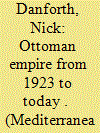

|
|
|
|
|
| Summary/Abstract |
Since its demise, the Ottoman Empire has been repeatedly reinvented. This essay traces the diverse and often unexpected ways that Ottoman history has served divergent political agendas over the past century, exploring the empire’s progression from religious to secular to pious and from multicultural to Turkish to tolerant.
|
|
|
|
|
|
|
|
|
|
|
|
|
|
|
|
| 7 |
ID:
181295
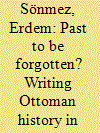

|
|
|
|
|
| Summary/Abstract |
Scholars of modern Turkish history have long asserted that Ottoman history and historiography were effectively silenced by the Kemalist elite in the early republican period. According to the existing scholarship, the Kemalist nation-builders regarded the new republic as the exact opposite of the ‘cosmopolitan’ Ottoman Empire, discrediting it as an illegitimate ancien régime. As a result of this break with the Ottoman past, which entailed the destruction or silencing of everything recalling it, the study of Ottoman history was discouraged and Ottoman historians were pushed to the margins of academic and intellectual life by the single-party regime. This article problematizes this widely accepted and oft-repeated argument that not only derives from but also reproduces the stereotyped perspectives on modern Turkish history. Focusing on the historical literature produced in the 1920s and 1930s, exploring the relationship between the single-party regime and Ottoman historians, and examining the temper and content of contemporary works on Ottoman history, this article aims to present a more nuanced picture of early republican Turkish history and historical writing, and argues that Ottoman historiography, which had already received a nationalized vocabulary and agenda before the republican era, continued to flourish in its own realm throughout all this period.
|
|
|
|
|
|
|
|
|
|
|
|
|
|
|
|
| 8 |
ID:
128210
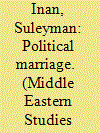

|
|
|
|
|
| Publication |
2014.
|
| Summary/Abstract |
Under the influence of popular history, recent historiography on the Ottomans has focused mainly on such subjects as the influence of women on politics and indirectly on issues of the harem. However, such a focus indicates limited information and an insufficient number of studies on the sons-in-law in the dynasty of the late Ottoman state. The purpose of this article is to develop a theoretical framework concerning sons-in-law in the dynasty of the late Ottoman state period by collating the related but limited references in the historical sources. In this context, such issues as the policy of marriage in the Ottoman dynasty, the status of the dynasty sons-in-law, and the privileges they had are studied in terms of the late period of the Ottomans. Thus, the study's major purpose is to discuss the late Ottoman history in the light of such an important but ignored subject.
|
|
|
|
|
|
|
|
|
|
|
|
|
|
|
|
| 9 |
ID:
147887
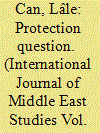

|
|
|
|
|
| Summary/Abstract |
This article examines the impact of the Ottoman Empire's battle against legal imperialism on the status of Central Asians in its domains, specifically after the promulgation of a nationality law in 1869 that classified them as foreigners. It traces how the threat of Muslim colonial subjects attaining European consular protections led to the emergence of a “Central Asian protection question”: whether Afghans, Bukharans, and Chinese Muslims had legitimate claims to European legal nationality and, by extension, capitulatory privileges. Through a number of case studies, the article shows how the Ottoman Foreign Ministry fused international legal norms and pan-Islamic claims to arrive at the position that Central Asians from informally colonized lands were not “real” subjects of European empires, and that they were under the exclusive protection of the caliphate. This strategy, I argue, undermined the creation of an Ottoman citizenship boundary and opened up a complex field of inter- and intraimperial contestation about who was a foreigner. In contrast to positive associations with legal pluralism in this period, Central Asian migrants and pilgrims who were protected by the caliph but not recognized as Ottomans or European subjects found that they could not benefit from practices such as forum shopping and affiliation switching. And while the notion of foreignness remained subject to multiple and conflicting interpretations across the empire, I argue that nationality as a legal category was incontrovertibly becoming a defining feature of these foreign Muslims' rights and status in the sultan's domains.
|
|
|
|
|
|
|
|
|
|
|
|
|
|
|
|
| 10 |
ID:
128224
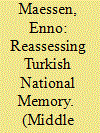

|
|
|
|
|
| Publication |
2014.
|
| Summary/Abstract |
In this article continuity and discontinuity of interpretations and manipulations of national memory during the successive governments of the Adalet ve Kalk?nma Partisi (Justice and Development Party - AKP) in Turkey are investigated. The strong continuities between the Islamist parties of the 1990s and the AKP, with regard to the way they consider and manipulate Ottoman history as a means of political legitimation, are demonstrated. In addition, the continuity between the AKP's style of governance and that of preceding governments is shown. The conclusion of the article is that, in addition to continuities with its Islamist predecessors, the AKP is to a large extent still embedded within the boundaries of the nationalist framework set out by Kemalism with regard to the party's stance on Turkish citizenship, national identity, traumas in national history and leader-centred politics.
|
|
|
|
|
|
|
|
|
|
|
|
|
|
|
|
| 11 |
ID:
101166


|
|
|
|
|
| Publication |
2010.
|
| Summary/Abstract |
Drawing on a range of recent studies and original sources, this article calls for a revision of the usual paradigm of disease in Ottoman history by applying a more interdisciplinary approach and new insights from environmental history. The historiography of disease in the Middle East developed from the late 1970s to the early 1990s envisioned a steady mortality from inevitable cycles of bubonic plague supposedly accepted with pious resignation by Ottoman Muslims. Focusing on the period from circa 1500 to 1800, the article advances three arguments. First, Ottoman Muslims sometimes did take action to escape or contain epidemics. Second, the region actually suffered from a variety of other infections that together had an equal or greater impact than bubonic plague. Third, shifting political, social, and environmental conditions-especially Little Ice Age climate fluctuations and population movements during the 17th century-played a major role in disease mortality and Ottoman demography.
|
|
|
|
|
|
|
|
|
|
|
|
|
|
|
|
| 12 |
ID:
188161
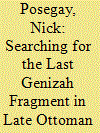

|
|
|
|
|
| Summary/Abstract |
The Cairo Genizah is well known as a repository for hundreds of thousands of manuscripts that the Jewish residents of Fustat (Old Cairo) produced and consumed in the premodern period. Foreign “collectors” acquired most of these manuscripts for European libraries in the second half of the nineteenth century, with the majority arriving at the Cambridge University Library in 1897 under the auspices of Solomon Schechter. Less well known is the fact that hundreds of Genizah fragments were produced in the late nineteenth century, even as European collectors were scouring Cairo for ancient texts. This later corpus includes witnesses to the social and economic history of late Ottoman Cairo and provides copious evidence for the material history of Egyptian Jewish literary activity at that time. Despite this, it remains understudied for both Ottoman and Jewish history. Late Genizah material also raises questions about the integrity of “Cairo Genizah” manuscript collections around the world, as some fragments postdate Schechter's Genizah “discovery,” and others were never in Egypt at all.
|
|
|
|
|
|
|
|
|
|
|
|
|
|
|
|
|
|
|
|
|